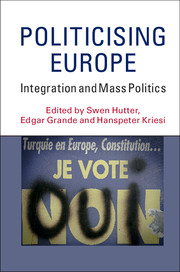Book contents
- Frontmatter
- Contents
- List of figures
- List of tables
- List of contributors
- Preface and acknowledgements
- Part I Theory and methods
- Part II Mapping the politicisation of European integration
- Part III Driving forces and consequences of politicisation
- 6 Constitutive issues as driving forces of politicisation?
- 7 The radical right as driving force in the electoral arena?
- 8 Framing Europe: are cultural-identitarian frames driving politicisation?
- 9 Politicisation, conflicts and the structuring of the EU political space
- 10 The euro crisis: a boost to the politicisation of European integration?
- Part IV Conclusions
- Methodological Appendix: measuring politicisation, benchmarks and data
- Bibliography
- Index
10 - The euro crisis: a boost to the politicisation of European integration?
from Part III - Driving forces and consequences of politicisation
Published online by Cambridge University Press: 05 March 2016
- Frontmatter
- Contents
- List of figures
- List of tables
- List of contributors
- Preface and acknowledgements
- Part I Theory and methods
- Part II Mapping the politicisation of European integration
- Part III Driving forces and consequences of politicisation
- 6 Constitutive issues as driving forces of politicisation?
- 7 The radical right as driving force in the electoral arena?
- 8 Framing Europe: are cultural-identitarian frames driving politicisation?
- 9 Politicisation, conflicts and the structuring of the EU political space
- 10 The euro crisis: a boost to the politicisation of European integration?
- Part IV Conclusions
- Methodological Appendix: measuring politicisation, benchmarks and data
- Bibliography
- Index
Summary
Introduction
Since it broke out with the financial troubles of Greece in early 2010, the euro crisis has been dominating the agendas of governments and European institutions, it has sparked an intensive public debate widely covered by the mass media, and it has unleashed a new wave of public protest, in particular in those countries most heavily affected by the crisis (Greece, Ireland, Portugal, Italy and Spain). The question of whether the euro crisis has contributed to the politicisation of the European integration process seems to be trivial. It certainly has! Less obvious is how the politicisation of the euro crisis compares to previous integration debates. The scholarly literature on this topic has been dominated by three propositions (see Statham and Trenz 2013a, 2015; Rauh and Zürn 2014; Zürn and Rauh 2014; Risse 2014b). First, scholars assume that the euro crisis has produced a ‘cosmopolitan moment’ (Beck 2000) in which national debates have been integrated and Europeanised in a unique way (Beck 2012; Risse 2014b). Second, they argue that ‘the Eurozone crisis has led to an unprecedented degree of politicisation’ (Statham and Trenz 2013a: 167) characterised by extraordinarily high levels of salience and particularly broad actor participation in public debates and protest events (Rauh and Zürn 2014). Third, this high level of conflict is explained not the least by the fact that politicisation in the euro crisis is not principally driven by authority transfer and membership conflicts, as in previous integration debates, but ‘by conflicts over redistribution both within and across member states’ (Statham and Trenz 2013a: 164). As a result, the euro crisis is thought to have changed not only the level and intensity of politicisation, but also its content and nature.
The empirical evidence provided thus far is mixed at best, however. An analysis of media debates and public opinion in the six founding member states of the EU by Rauh and Zürn (2014) shows a significant increase in politicisation since the early 1990s with a clear peak in the euro crisis. A comparative review of national elections in Europe shows that governments have been punished in elections following the euro crisis regardless of their party-political affiliation (Kriesi 2014).
- Type
- Chapter
- Information
- Politicising EuropeIntegration and Mass Politics, pp. 240 - 276Publisher: Cambridge University PressPrint publication year: 2016
- 33
- Cited by



